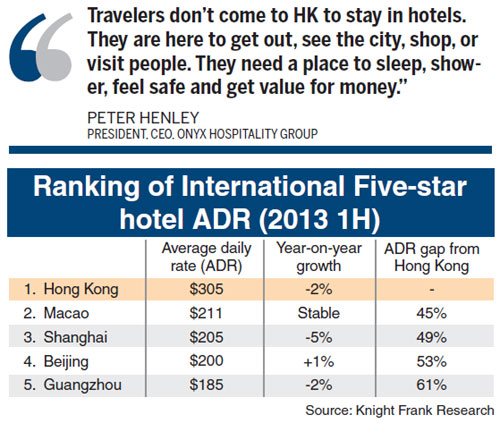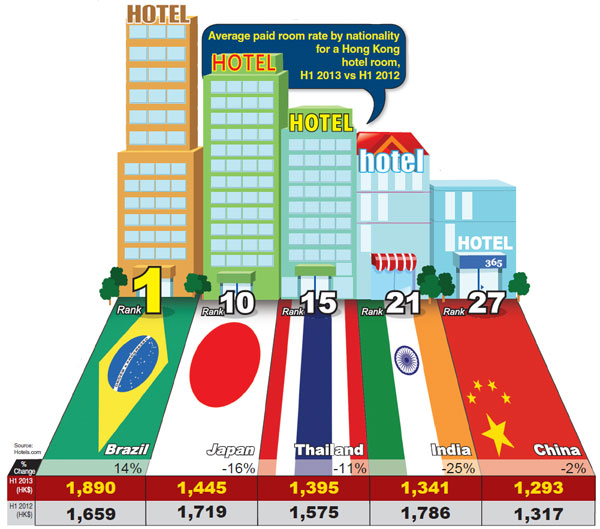Killing the goose that laid Golden Week
Updated: 2013-10-18 08:37
By Li Tao(HK Edition)
|
|||||||
There was the Golden Age of tourism. Mainland visitors streamed over the border. Everyone was happy. Then someone came up with the idea to offer tours practically free - and beat mainland visitors over the heads to buy from local retailers ... and the Golden Age of tourism came to an end. Li Tao reports.
Hong Kong consistently rates among preferred destinations for Chinese mainland travelers, even though their enthusiasm forever has been dampened by perennially inflated hotel rates in the city. This October, however, came the earthquake that forced local hotels to face the new reality about what mainlanders are willing to pay.
Very suddenly, at what normally would be a peak time for cross-border tourism, the numbers dropped sharply. The Hong Kong Tourist Bureau reported that mainland visitor arrivals over the seven-day "Golden Week" holiday, commencing Oct 1, fell as much as 30 percent, over previous years.
The mechanism that set off the sudden climate change was a newly implemented tourist law on the mainland. Effective Oct 1, mainland authorities banned low-cost and even no-cost Hong Kong vacation packages that previously had lured mainland visitors of a "vacation, they weren't likely to forget". The packages offered the travelers little vacation fun, but instead, transformed them into captive shoppers who were herded from one retail outlet to another by their tour guides. If they didn't buy enough merchandise to earn their guides a fat commission, they heard about it in no uncertain terms. Videos posted online caught Hong Kong tour guides demanding that their mainland charges stop being cheapskates and buy more - to recompense the tour company for the cost of their travel. Hong Kong's tourist industry got a black eye and a new, more restrictive law.
Drop in numbers
The immediate effect of the law was showcased by one group that came to Hong Kong for National Day. Individual tickets were 5,000 yuan ($817) to 6,000 yuan. Before the new law the tours would have cost 2,000 to 3,000 yuan per ticket. That law was put in place to protect tourists from abuse. It's also meant Hong Kong's appeal to mainland tourists had fallen. Only 300 to 360 tours came here from the mainland during the National Day holidays. In the past, even on ordinary days, the number was between 420 and 430. And prices for tours to Hong Kong now are comparable to other destinations for mainland travelers.
The fall in visitor numbers created an almost unheard of abundance of available hotel rooms in a city that previously was so heavily booked that no rooms were available at any price. During this year's Golden Week holiday, even walk-in guests could get a room, usually at discounts of up to 10 percent.
Chen Jian'an said he was not planning to spend a night in Hong Kong during Golden Week this year. He'd given up on a Hong Kong Golden Week celebration years ago. He lives in Guangzhou. His usual practice is to come to Hong Kong, do some shopping, have lunch and head home on the same day. This month, things were different. Chen noted a lot of promotions online for Hong Kong hotels. He decided to check them out.
"The rates are really favorable," Chen told China Daily. "I booked a three-to-four-star hotel in Kowloon adjacent to shopping areas on Oct 2, costing me 900 yuan per night. It was on a website. I tried to do the same thing several times before but there were never any rooms left during 'Golden Week, ' or there were only luxury suites available which I couldn't afford at all."
Chen said eventually he would be able to spend a night in Hong Kong to enjoy something other than just shopping. "Facilities and room sizes of the hotel I booked this time are not good enough for the amount of money I paid, I think. It was reasonable compared with past times, but still a bit exorbitant," he added.
A Knight Frank report released in September showed that during the first half of 2013, Hong Kong hotels remained the highest priced among cities in Greater China, in terms of average daily rates. ADR remained steady at $305, followed by $211 in Macao, $205 in Shanghai, $200 in Beijing and $185 in Guangzhou.
Additional research by the Hogg Robinson Group, a British firm offering travel services, rated Hong Kong the fourth most expensive place to stay in 2012, in a survey of hotel rates in the 55 most expensive global cities. Research showed average hotel prices reached $332 a night in Hong Kong last year, creating a deterrent for budget-minded travelers.
"Hong Kong's tourism industry outlook will be positive, given the number of tourism-related projects in the pipeline, including the Ocean Park and Hong Kong Disneyland expansions, the opening of more berths at Kai Tak Cruise Terminal in Kowloon East as well as the proposed observation wheel in front of the Central piers," Thomas Lam, director and head of research & consultancy of estate agent Knight Frank, predicted in the report.
Hotels hit
However, Lam might have neglected or underestimated the effect of the newly introduced tourism law on the mainland. For example, this year's Golden Week was nothing like recent years, when mainland visitor arrivals to Hong Kong would skyrocket - or likewise, Chinese Lunar New Year. Local hotel rates might double or even triple because of the scarcity of rooms. This year, the sudden decrease in the number of tour groups hit the hotels directly.
Michael Li, executive director of The Federation of Hong Kong Hotel Owners, said overall occupancy rates in city hotels reached only 80 percent during the long holiday this time. Many hotels had to offer discounts, pulling down average hotel rates at least 10 percent over previous years.
Although hotel rates in Hong Kong are under downward pressure with the declining numbers of mainland visitors, the city still faces a relative shortage of supply of hotel rooms.
In the first half of the year, mainland visitors remained the dominant factor in the tourism market in Hong Kong, accounting for 74.1 percent of arrivals, according to official government data. The number of mainland visitors who stayed overnight grew 16.2 percent to 7.84 million, and there was a 3.4 percent drop for overnight visitors from other parts of the world.
Exploding demand for hotel rooms last year, was in sharp contrast to the slow pace of new hotel room construction in the city. In the first six months of the year, four new four-star hotels opened, adding 1,235 rooms. No new five-star hotels opened during the same period and that situation is expected to persist as the market drifts more toward boutique and resort type hotels. Strong visitor numbers from the Chinese mainland and the increasing number of business travelers will continue to drive hotel demand in the city, according to Lam of Knight Frank.
A projection by the Hong Kong Tourism Board indicated that the number of hotels in the city would be 241, with 71,889 rooms by the end of this year and 271 hotels with 76, 533 rooms by 2017. The 2013 number reflects only a 6.7 percent increase over 2012 and a 13.6 per cent increase in the number of rooms, according to the tourism board.
Peter Henley, president and chief executive officer of ONYX Hospitality Group, tells China Daily that mainland travelers to Hong Kong tend not to stay long in the city, usually two to three nights. One reason they don't stay long is to save on hotel bills.
"Travelers don't come here to stay in the hotel rooms. As a trip advisor commented, they (tourists) are here to get out, see Hong Kong, shop in Hong Kong, or visit people in Hong Kong. Therefore, they need a place to sleep, to shower, to feel safe and get value for money," said Henley.
One important hotel industry trend is emphasis on "value." Although value consciousness doesn't necessarily equate to "cheap", most travelers, want to make sure they are getting good value for every dollar they spend, says Henley, adding it has become an increasing challenge for the hotel industry to continually add value in recent times.
The latest Hotel Price Index (HPI) from Hotel.com on Oct 3 showed that even these top-spending travelers from the mainland are less willing to spend huge amounts of money on accommodation in Hong Kong. Despite being the largest source market, Chinese mainland travelers, appeared only in 27th place in terms of accommodation expenses in the city. Their average room rate of HK$1,293 ($211.3), was down 2 percent over the first half of 2012.
Brazilian travelers topped the list with an average room rate increase of 14 percent, to HK$1,890, followed by Switzerland, the highest European spenders, paying HK$1,717 per night. Spending on hotel rooms by mainland travelers also fell behind spending by visitors from India and Indonesia, according to the survey.
The reality remains, hotel rates in Hong Kong are still too expensive and lower-priced inns generally are too shabby. People find it so difficult to find a decent place to stay at reasonable rates, says Henley.
"And mainland travelers are particularly value conscious. They are not afraid to spend, but they will also not waste money," says Henley. Therefore, boosting the supply of mid-range hotel rooms at reasonable rates becomes eminently important if the city is to retain the interest of mainland travelers, he adds.
Contact the writer at litao@chinadailyhk.com


(HK Edition 10/18/2013 page5)